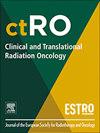评估急性放射性皮炎严重程度的工具和结果的系统综述
IF 2.7
3区 医学
Q3 ONCOLOGY
引用次数: 0
摘要
急性放射性皮炎(ARD)是接受放射治疗的患者常见的不良反应。需要有效的评估工具来准确测量和管理ARD对患者生活质量和治疗结果的影响。本研究的目的是评估用于ARD评估的各种工具和结果测量。对1946年至2024年3月期间MEDLINE®、Embase和Cochrane的记录进行了系统评价。共纳入423项研究,包括227项随机对照试验(rct)。该综述确定了58种用于评估ARD的不同工具,包括临床医生和患者报告的结果、生活质量仪器和生物物理测量。最常使用的工具是放射治疗肿瘤学组标准、不良事件通用术语标准、皮肤指数-16、视觉模拟量表、皮肤病生活质量指数、欧洲癌症研究和治疗组织生活质量C30、辐射诱导皮肤反应评估量表、皮肤毒性评估工具、摄影、反射分光光度法和角膜测量仪。对ARD评估工具的调查揭示了工具的广泛应用,但由于普遍缺乏共识而受到限制,阻碍了标准化工具集的认可。工具使用的可变性需要进一步的研究,特别是高质量的随机对照试验,以建立有效和可靠的测量方法。未来的出版物,包括基于德尔菲共识的建议,预计将解决这些差距,旨在标准化ARD评估方法。本文章由计算机程序翻译,如有差异,请以英文原文为准。
Systematic review of the tools and outcomes for the assessment of acute radiation dermatitis severity
Acute radiation dermatitis (ARD) is a common adverse effect experienced by patients undergoing radiation therapy. Effective assessment tools to accurately measure and manage ARD’s impact on patients’ quality of life and treatment outcomes is needed. The aim of this study was to evaluate the diverse tools and outcome measures used in the assessment of ARD. A systematic review of MEDLINE®, Embase, and Cochrane was conducted for records 1946-March 2024. A total of 423 studies, including 227 randomized controlled trials (RCTs), were included in the analysis. The review identified 58 distinct tools utilized in the assessment of ARD including clinician and patient-reported outcomes, quality-of-life instruments, and biophysical measures. The most frequently employed tools were the Radiation Therapy Oncology Group criteria, Common Terminology Criteria for Adverse Events, Skindex-16, Visual Analogue Scale, Dermatology Life Quality Index, European Organization for Research and Treatment of Cancer Quality of Life C30, Radiation-Induced Skin Reaction Assessment Scale, Skin Toxicity Assessment Tool, photography, reflectance spectrophotometry, and the corneometer. This investigation into ARD assessment tools reveals a broad application of instruments but is limited by a pervasive lack of consensus, preventing the endorsement of a standardized toolset. The variability in tool use necessitates further research, particularly high-quality RCTs, to establish validated and reliable measures. Future publications, including Delphi consensus-based recommendations, are anticipated to address these gaps, aiming to standardize ARD assessment methodologies.
求助全文
通过发布文献求助,成功后即可免费获取论文全文。
去求助
来源期刊

Clinical and Translational Radiation Oncology
Medicine-Radiology, Nuclear Medicine and Imaging
CiteScore
5.30
自引率
3.20%
发文量
114
审稿时长
40 days
 求助内容:
求助内容: 应助结果提醒方式:
应助结果提醒方式:


